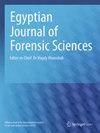Forensic short tandem repeat markers alteration in cancerous tissues: a scoping review
IF 1.3
Q3 MEDICINE, LEGAL
引用次数: 0
Abstract
Short Tandem Repeats (STRs) are segments of DNA composed of a short sequence of nucleotides that repeat consecutively. These repeating sequences exhibit distinct lengths and nucleotide sequences among individuals, showcasing high variability and uniqueness. The STR profile remains consistent across all cells in an individual’s body. Nonetheless, changes in the STR profile have been documented in cancerous tissues. This scoping review aimed to investigate the occurrence and pattern of forensic STR markers alterations in cancerous tissues. We conducted a scoping review of the English-language publications published between 2002 and 2022 in the PubMed, Science Direct, and Scopus databases and a manual search of reference lists from reviewed papers. The review was carried out in compliance with the Preferred Reporting Items for Systematic reviews and Meta-Analyses extension for Scoping Reviews. Our search resulted in a total of 1,065 articles associating forensic STR studies with cancerous tissues. A total of 18 of these studies met our inclusion criteria. The D18S51 marker was most often found to be altered when associated with cancers such as breast, colorectal, gastric, gynaecology, and lung cancers. Following with that, FGA, VWA, D19S433, and D13S317 markers could as well be seen to have allelic alteration in cancerous tissues. Four other STR markers (TPOX, D7S820, D2S1338, and Penta D) could be potentially represented as stable STR markers in cancerous tissues. According to our review, colorectal cancer tissue has the highest level of genomic instability compared to that of other cancer types. In summary, the genetic instability caused by faulty DNA mismatch repair processes in human carcinomas can pose challenges for forensic genotyping and DNA profile matching.癌症组织中的法医短串联重复标记改变:范围综述
短串联重复序列(STR)是由连续重复的核苷酸短序列组成的 DNA 片段。这些重复序列在个体间表现出不同的长度和核苷酸序列,具有很高的变异性和独特性。个体体内所有细胞的 STR 特征保持一致。然而,在癌症组织中也有 STR 图谱变化的记录。本范围综述旨在调查癌症组织中法医 STR 标记改变的发生情况和模式。我们对 PubMed、Science Direct 和 Scopus 数据库中 2002 年至 2022 年间发表的英文出版物进行了范围界定综述,并对综述论文的参考文献列表进行了人工检索。该综述是根据《系统综述和元分析首选报告项目》(Preferred Reporting Items for Systematic Review and Meta-Analyses)扩展到《范围界定综述》(Scoping Reviews)的要求进行的。我们的检索结果显示,共有 1,065 篇文章将法医 STR 研究与癌症组织相关联。其中共有 18 项研究符合我们的纳入标准。在与乳腺癌、结直肠癌、胃癌、妇科癌和肺癌等癌症相关的研究中,D18S51 标记最常发生变化。此外,FGA、VWA、D19S433 和 D13S317 标记在癌症组织中也有等位基因改变。另外四个 STR 标记(TPOX、D7S820、D2S1338 和 Penta D)有可能成为癌症组织中稳定的 STR 标记。根据我们的研究,与其他癌症类型相比,结直肠癌组织的基因组不稳定性水平最高。总之,人类癌症中 DNA 错配修复过程的缺陷所导致的基因不稳定性会给法医基因分型和 DNA 图谱比对带来挑战。
本文章由计算机程序翻译,如有差异,请以英文原文为准。
求助全文
约1分钟内获得全文
求助全文
来源期刊

Egyptian journal of forensic sciences
MEDICINE, LEGAL-
CiteScore
2.00
自引率
0.00%
发文量
51
审稿时长
17 weeks
期刊介绍:
Egyptian Journal of Forensic Sciences, the official publication of The International Association of Law and Forensic Sciences (IALFS), is an open access journal that publishes articles in the forensic sciences, pathology and clinical forensic medicine and its related specialities. The journal carries classic reviews, case studies, original research, hypotheses and learning points, offering critical analysis and scientific appraisal.
 求助内容:
求助内容: 应助结果提醒方式:
应助结果提醒方式:


